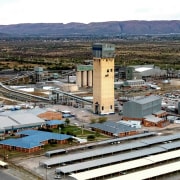|
Getting your Trinity Audio player ready...
|
 By Valencia Talane
By Valencia Talane
Auditor-General Terrence Nombembe’s local government headache seems far from over. In his latest report on the financial performance of municipalities during 2011/12, Nombembe on Tuesday revealed an overall bleak picture of local government, with fewer improvements than were recorded in the previous financial year.
Disappointingly, none of the country’s eight metro municipalities achieved clean audits.
Nombembe completed audits of 317 metropolitan municipalities, district municipalities, local municipalities and municipal entities for the financial year ended August 2012.
Only three municipalities in the Western Cape out the 278 across the country registered improvements in their financial reporting. He commended the George, Langeberg and Mossel Bay local municipalities, saying they have proved that “clean administration is achievable where there is leadership commitment”.
Nombembe also praised three municipal entities – the Johannesburg Fresh Produce Market, Durban Marine Theme Park and the Durban International Convention Centre – for their equally exemplary results.
The results of these municipalities, said Nombembe, are “a testimony that where political and administrative leadership set the right tone and work together to implement and constantly monitor basic internal controls, good governance is achievable”.
The audits from the rest of the country, however, were not as inspiring. Only 48% of the auditees obtained unqualified opinions, but not without the help of Nombembe’s team, which intervened from time to time to help rectify errors in records submitted before the final deadline for submissions.
Complaints in Corruption Watch’s database about corruption in metro municipalities make up about a quarter (or 212) of the almost 800 local government tip-offs we have received since launching.
The most common types of corruption alleged in these reports are bribery against officials, including metro cops; abuse of power or influence by councillors; as well as nepotism and misuse of municipal resources such as vehicles and public and recreational facilities.
Procurement corruption within municipalities is also rife, our tip-offs from the public indicate. A procurement irregularity exposed by Corruption Watch in April this year resulted in the suspension of three employees at the Dr JS Moroka municipalities in Mpumalanga. JS Moroka is a local municipality that falls under the Nkgangala District Municipality.
Too soon to see fruits of interventions
Nombembe noted in his 2011/12 local government report the increase in interventions by national and provincial treasury at municipal level to help remedy the problem of weak financial management and lack of leadership. But the effects of these actions have not been felt yet, he said.
Media reports on Monday revealed how Finance Minister Pravin Gordhan had announced the deployment of a task team at Nelson Mandela Bay Metro to help turn the municipality’s financial management around. The region has seen a number of controversial incidents in recent months, including criminal charges being lodged against its mayor and deputy mayor by the DA. Former municipal manager Lindiwe Msengana-Ndlela resigned just five months into her post, reportedly citing political interference in her job.
Treasury took a decision in January to halt its flow of funding to Free State’s Nala municipality after several failed attempts to get it to submit credible financial reports as required by the Municipal Finance Management Act. It was only after a team of treasury officials had worked with the municipality’s leadership that a turnaround strategy was adopted.
Another intervention was announced last month, this time by the Department of Public Service and Administration, which would also include a task team visit to municipalities in the Kenneth Kaunda District in North West. Lack of capacity in local government, he said, affected this tier of the state’s ability to account for the public resources it has to administer on behalf of society.
In almost three quarters of municipalities audited, Nombembe noted a vacuum in key skills and competencies for senior positions, hampering the production of credible financial statement and performance reports.
A consequence of this was the appointment of consultants who helped with financial reporting, which in itself is an expensive exercise. Nombembe raised concern that municipalities were not prioritising skills development for key employees.
The Auditor-General called on municipal councillors to lead the fight against complacency in financial reporting and turn around poor audits. “They should prioritise their pursuit of the knowledge and skills they need to perform their oversight duties, and insist on support from national and provincial government for their continuous development,” he said.
“If councillors do not feel equipped and enabled to effectively oversee municipal administration, they will not be able to hold municipal management to account and enforce consequences for poor performance and transgressions.”
Councillors must also strengthen their abilities to steer their municipalities towards achieving developmental objectives; stick to the necessary legislation; and account for actions in a credible and transparent manner, Nombembe added.








